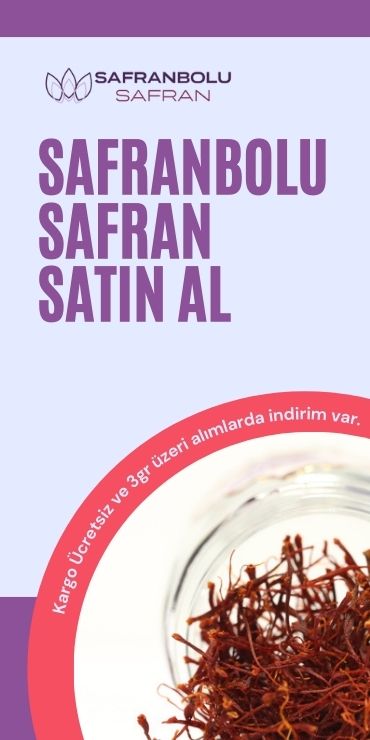
Kalp hastalığı risk faktörlerini azaltabilir
Hayvan çalışmaları ve test tüpü çalışmaları, safranın antioksidan özelliklerinin kan kolesterolünü düşürebileceğini, kan damarlarının ve arterlerin tıkanmasını önleyebileceğini göstermektedir.
Santral obezite, koroner arter hastalığı (KAH) için bağımsız bir risk faktörüdür. Hipertansiyon,
hiperlipidemi ve insülin direnci yoluyla kardiyo-metabolik riskleri artırabilir. Safran ve biyoaktif
bileşikleri (krosin ve krosetin), bazı metabolik bozuklukları birçok mekanizma yoluyla
değiştirebilir.
Safranın iskemik kalp hastalığını korumadaki rolü de biyokimyasal ve histopatolojik
bulgularla kanıtlan- mıştır (Sadati ve ark., 2016).
8 haftalık randomize, çift kör ve plasebo kontrollü, 40 ila 65 yaşları arasında KAH olan 84
hasta üzerinde gerçekleştirilen çalışmada katılımcılar, günlük 30 mg safran sulu özüt veya
30 mg krosin veya plasebo takviyesi almak için rastgele gruplara ayrıldı. Çalışma öncesi ve
sonrasında iştah, diyet alımı, antropometri, vücut kompozisyonu, biyokimyasal analizler
değerlendirildi. Safran sulu özütü ve krosin grubunda, antropometrik ve bazı vücut
kompozisyonu değişkenleri, müdahaleden sonra bir iyileşme modeli ortaya koydu. Safran
özütü grubunda vücut kitle indeksi (VKİ), bel çevresi ve yağ kütle değerlerinde azalma krosin
grubuna göre anlamlı olarak daha fazlaydı (P <0.001). Çalışmanın sonunda lipid profil
parametrelerinde anlamlı bir fark yoktu. Hem safran özütü hem de krosin, enerji ve diyet alım
ortalama değerlerinde önemli bir düşüş sağladı (P <0.001 ve P = 0.046), plasebo grubunda
değişmeden kalırken diğer grupta iştah önemli ölçüde azaldı (P <0.001 ve P = Sırasıyla
0,029). Sonuç olarak koroner arter hastalığı olan hastalarda safran sulu özütü ve krosinin
anti-obezite özelliğinin değerlendirilmesi ile ilgili bu çalışmanın sonuçları umut vericidir.
REKLAM
Gerçek Safranbolu Safranı'nı Nasıl Alabilirim?
Referanslar
1-Therapeutic Benefits of Saffron in Brain Diseases: New Lights on Possible
Pharmacological Mechanisms
https://www.sciencedirect.com/science/article/pii/B9780128184622000103
2-Saffron and crocin improved appetite, dietary intakes and body composition in patients
with coronary artery disease
https://pubmed.ncbi.nlm.nih.gov/29391933/
3-A review of the dietary flavonoid, kaempferol on human health and cancer
chemoprevention
https://pubmed.ncbi.nlm.nih.gov/23497863/
4-Saffron (Crocus sativus L.) and major depressive disorder: a meta-analysis of randomized
clinical trials
https://pubmed.ncbi.nlm.nih.gov/24299602/
5-Crocus sativus L. (petal) in the treatment of mild-to-moderate depression: a double-blind,
randomized and placebo-controlled trial
https://pubmed.ncbi.nlm.nih.gov/16979327/
6-Chronic inflammation and oxidative stress as a major cause of age-related diseases and
cancer
https://pubmed.ncbi.nlm.nih.gov/19149749/
7-https://www.drugs.com/npp/saffron.html
8-Crocin from Crocus sativus possesses significant anti-proliferation effects on human
colorectal cancer cells
https://pubmed.ncbi.nlm.nih.gov/18004240/
9-Saffron in the treatment of depression, anxiety and other mental disorders: Current
evidence and potential mechanisms of action
https://www.sciencedirect.com/science/article/abs/pii/S0165032717315884
10-Crocin inhibits cell proliferation and enhances cisplatin and pemetrexed chemosensitivity
in lung cancer cells
https://pubmed.ncbi.nlm.nih.gov/26798587/
11-http://apps.who.int/medicinedocs/en/d/Js2200e/
12-http://plants.usda.gov
13-Epidemiology of Premenstrual Syndrome (PMS)-A Systematic Review and Meta-Analysis
Study
https://pubmed.ncbi.nlm.nih.gov/24701496/
14-Psychological and neuroendocrinological effects of odor of saffron (Crocus sativus)
https://pubmed.ncbi.nlm.nih.gov/21242071/
15-Effect of saffron on fluoxetine-induced sexual impairment in men: randomized
double-blind placebo-controlled trial
https://pubmed.ncbi.nlm.nih.gov/22552758/
16- Safarinejad MR, Shafiei N, Safarinejad S. A prospective double-blind randomized
placebo-controlled study of the effect of saffron (Crocus sativus Linn.) on semen parameters
and seminal plasma antioxidant capacity in infertile men with idiopathic
oligoasthenoteratozoospermia. Phytother Res. 2011;25(4):508-516.20824894
17- Heidary M, Vahhabi S, Reza Nejadi J, et al. Effect of saffron on semen parameters of
infertile men [published correction appears in Urol J. 2009;6(1):71]. Urol J.
2008;5(4):255-259.19101900
18- Gout B, Bourges C, Paineau-Dubreuil S. Satiereal, a Crocus sativus L extract, reduces
snacking and increases satiety in a randomized placebo-controlled study of mildly
overweight, healthy women. Nutr Res. 2010;30(5):305-313.20579522
19- Mashmoul M, Azlan A, Khaza’ai H, Yusof BN, Noor SM. Saffron: a natural potent
antioxidant as a promising anti-obesity drug. Antioxidants (Basel).
2013;2(4):293-308.26784466
20- Poma A, Fontecchio G, Carlucci G, Chichiriccò G. Anti-inflammatory properties of drugs
from saffron crocus. Antiinflamm Antiallergy Agents Med Chem. 2012;11(1):37-51.22934747
21-. Meamarbashi A, Rajabi A. Preventive effects of 10-day supplementation with saffron
and indomethacin on delayed-onset muscle soreness. Clin J Sport Med.
2015;25(2):105-112.24915175
22- Bisti S, Maccarone R, Falsini B. Saffron and retina: neuroprotection and
pharmacokinetics. Vis Neurosci. 2014;31(4-5):355-361.24819927
23-Satiereal, a Crocus sativus L extract, reduces snacking and increases satiety in a
randomized placebo-controlled study of mildly overweight, healthy women
https://pubmed.ncbi.nlm.nih.gov/20579522/
24- The effect of Crocus sativus (saffron) on the severity of premenstrual syndrome
https://www.sciencedirect.com/science/article/abs/pii/S187638201530010X
25- Immunomodulatory and antioxidant effects of saffron aqueous extract (Crocus sativus L.)
on streptozotocin-induced diabetes in rats
https://pubmed.ncbi.nlm.nih.gov/28460761/
26- Short-term Outcomes of Saffron Supplementation in Patients with Age-related Macular
Degeneration: A Double-blind, Placebo-controlled, Randomized Trial
https://pubmed.ncbi.nlm.nih.gov/28289690/
27- Saffron in the treatment of patients with mild to moderate Alzheimer’s disease: a
16-week, randomized and placebo-controlled trial
https://pubmed.ncbi.nlm.nih.gov/20831681/
28- http://dergi.fabad.org.tr/pdf/volum44/Issue1/79-88.pdf



